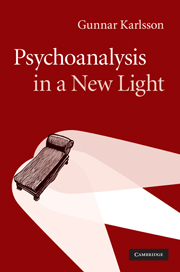Book contents
- Frontmatter
- Contents
- Preface
- Acknowledgements
- List of figures
- 1 Phenomenology and psychoanalysis
- 2 The life-world as the ground for sciences
- 3 A critical examination of neuropsychoanalysis
- 4 The conceptualization of the psychical in psychoanalysis
- 5 The libido as the core of the unconscious
- 6 The grounding of libido in the life-world experience
- 7 Beyond the pleasure principle: the affirmation of existence
- 8 The question of truth claims in psychoanalysis
- Concluding remarks
- References
- Index
2 - The life-world as the ground for sciences
Published online by Cambridge University Press: 05 June 2012
- Frontmatter
- Contents
- Preface
- Acknowledgements
- List of figures
- 1 Phenomenology and psychoanalysis
- 2 The life-world as the ground for sciences
- 3 A critical examination of neuropsychoanalysis
- 4 The conceptualization of the psychical in psychoanalysis
- 5 The libido as the core of the unconscious
- 6 The grounding of libido in the life-world experience
- 7 Beyond the pleasure principle: the affirmation of existence
- 8 The question of truth claims in psychoanalysis
- Concluding remarks
- References
- Index
Summary
Husserl thought that it was the task of phenomenology to lay the epistemological foundation for other sciences. The expression ‘epistemological foundation’ in this context means the delineation of the conditions for the possibility of the science in question. Psychoanalysis never became the object for such a specific epistemological grounding. However, Husserl carried out epistemological works for other human sciences, in particular for psychology, as well as for natural science and logic.
Whether psychoanalysis can claim to be a science – and, in that case, what kind of science it is – has been a recurrent subject of contention. The fact that psychoanalysis has had difficulty obtaining scientific recognition within an empiricistic or positivistic frame of reference is hardly surprising. From the vantage point of such a scientific ideal, it seems uncontroversial to declare psychoanalysis either as non-scientific (Popper 1959, 1972) or proven to be scientifically invalid (Grünbaum 1984). However, positivism has lost ground during recent decades, and today one can no longer talk about a unified positivistic orientation. But remnants of positivistic, empiricistic thinking with physics as the scientific model still exist, even within, for example, psychoanalysis.
In the first decade of the twenty-first century, one has been able to discern ideas within psychoanalytic circles that the scientific status of psychoanalysis should be tested by means of other empirical research, as, for instance, when one evaluates the outcome of psychoanalysis on the basis of certain objective criteria. Pragmatic efficiency becomes synonymous with being scientific.
- Type
- Chapter
- Information
- Psychoanalysis in a New Light , pp. 21 - 39Publisher: Cambridge University PressPrint publication year: 2010



